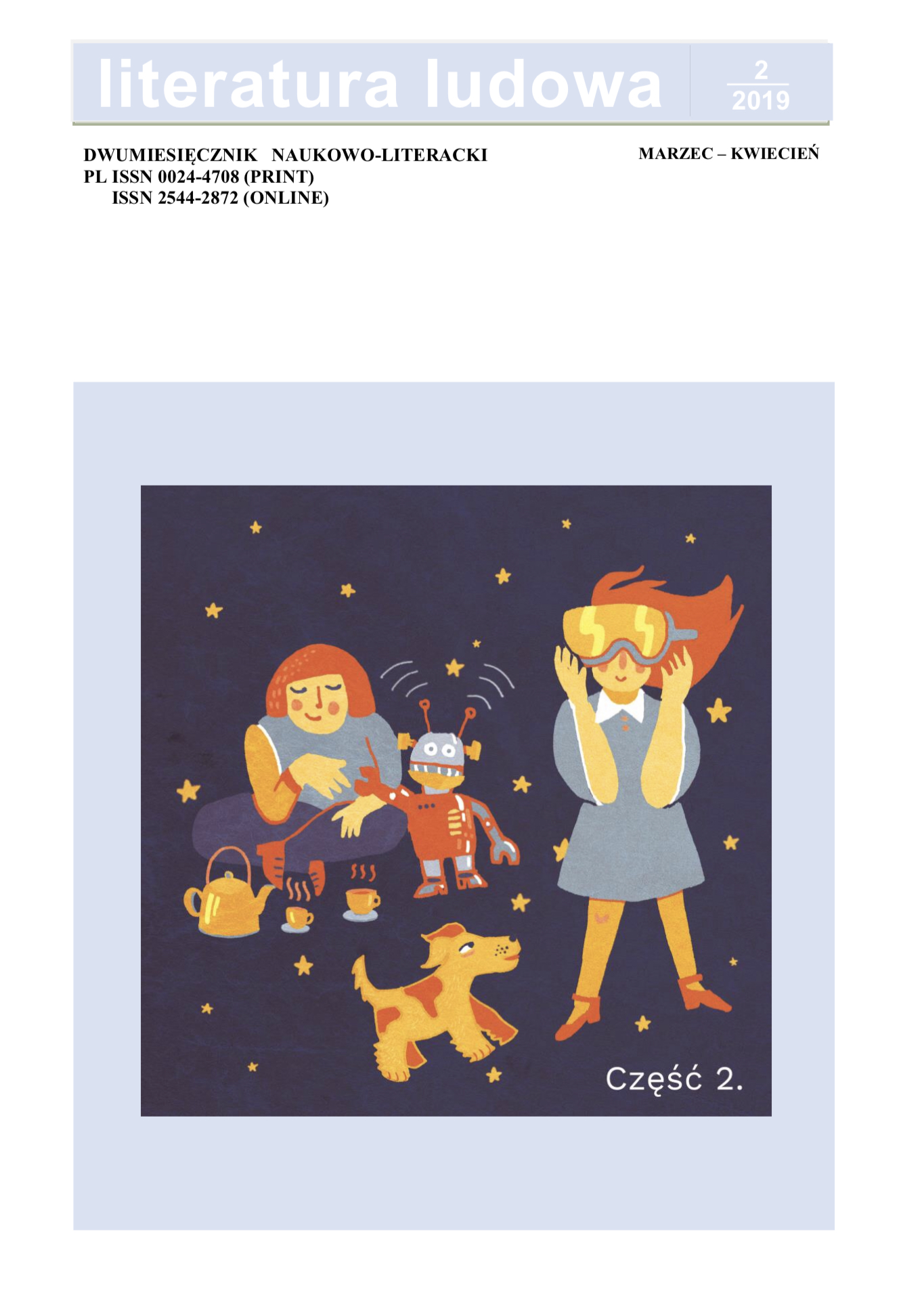TAMING THE FUTURE: THOUGHTS, DREAMS, AND IMAGINATION IN LOS INDOMABLES PENSAMIENTOS DEL SEÑOR O BY AMALIA BOSELLI AND VERO GATTI
DOI:
https://doi.org/10.12775/LL.2.2019.001Keywords
Argentine children’s literature, future orientation, Poulet, Rousseau, mental imagery, daydreaming, cognitive sciencesAbstract
The paper focuses on the Argentine picture book for children by Amalia Boselli and Vero Gatti titled Los indomables pensamientos del Señor O from 2013. It is suggested to analyze the text with respect to Rousseau’s philosophical reflections on time and dreaming as seen by Poulet, and on the basis of the future orientation paradigm and the concept of daydreaming studied from the psychological perspective. The research revolves around the relationship between the main character’s mental imagery and his perception of the future, with regards to actions he undertakes. Over time, Mr. O’s thinking process becomes dominated by the anticipatory imagination which deprives him of boundless creativity experienced in childhood. Eventually the protagonist’s journey ends with the triumph of creative imagination. It is through numerous references to the emotionality and sensuality — present at both verbal and visual levels — that the text by Boselli and Gatti intensifies a singular reading experience. Thus, despite several simplifications and generalizations, it opens up to the individualized (child and adult) reader response.References
BOSELLI, A., GATTI, V. (2016). Los indomables pensamientos del Señor O. Buenos Aires: Adriana Hidalgo editora S.A.
BURNETT, F.H. (1999). Tajemniczy ogród (przeł. J. Włodarkiewicz). Warszawa: Prószyński i S-ka.
CACKOWSKA, M. (2009). Czym jest książka obrazkowa? O pojmowaniu książki obrazkowej dla dzieci w Polsce – część II. „Ryms”, 6, s. 14-16. Pozyskano z http://ryms.pl/artykul_szczegoly/12/czym-jest-ksiazka-obrazkowa-o-pojmowaniu- ksiazki-obrazkowej-dla-dzieci-w-polsce-czesc-i-ii-i-iii.html.
CACKOWSKA, M., DYMEL-TRZEBIATOWSKA, H., SZYŁAK, J. (red.) (2017). Książka obrazkowa. Wprowadzenie. Poznań: Instytut Kultury Popularnej.
ECO, U. (1996). Nadinterpretowanie tekstów. W: S. Collini (red.), Interpretacja i nadinterpretacja. Kraków: Wydawnictwo ZNAK.
FORTUNA, P. (2007). Zmiana przekonań w wyimaginowanym świecie. Rola wyobraźni w perswazji narracyjnej. W: P. Francuz (red.), Obrazy w umyśle: studia nad percepcją i wyobraźnią (s. 249-270). Warszawa: Scholar.
HALLBERG, K. (1982). Litteraturvetenskapen och bilderboksforskningen. „Tidskrift főr litteraturvetenskap”, 3–4, s. 163–168.
KLINGER, E. (1990). Daydreaming: Using Waking Fantasy and Imagery for Self- Knowledge and Creativity. Los Angeles: Jeremy P. Tarcher.
KLINGER, E. (1994). On Living Tomorrow Today: The Quality of Inner Life as aFunction of Goal Expectations. W: Z. Zalewski (red.), Psychology of Future Orientation (s. 97-106). Lublin: TN KUL.
ŁAPIŃSKI, Z. (2009). Widziane, wyobrażone, pomyślane. „Teksty Drugie”, 1-2, s. 46-56.
MARUSZEWSKI, T. (2011). Psychologia poznania. Umysł i świat. Gdańsk: Gdańskie Wydawnictwo Psychologiczne.
MĘCZKOWSKA-CHRISTIANSEN, A. (2010). Dyskursy dzieciństwa a polityka. Pomiędzy wykluczeniem a obywatelskim uczestnictwem. „Problemy Wczesnej Edukacji”, 2 (12), s. 25-38.
NIKOLAJEVA, M., SCOTT, C. (2006). How Picturebooks Work, New York-London: Routledge.
POULET, G. (1977). Metamorfozy czasu: szkice krytyczne. Warszawa: Państwowy Instytut Wydawniczy.
REISBERG, D., WILSON, M., Smith, J.D. (1991). Auditory Imagery and Inner Speech. W: Logie, R.H., Denis, M. (red.), Mental Images in Human Cognition (s. 59-81). Amsterdam-New York: North-Holland.
REMBOWSKA-PŁUCIENNIK, M. (2012). Poetyka intersubiektywności: kognitywistyczna teoria narracji a proza XX wieku. Toruń: Wydawnictwo Naukowe Uniwersytetu Mikołaja Kopernika.
REMBOWSKA-PŁUCIENNIK, M. (2009). Wizualne efekty i afekty. Obrazowanie mentalne a emocjonalne zaangażowanie czytelnika. „Teksty Drugie”, 6, s. 120-134.
RICOEUR, P. (1984). Proces metaforyczny jako poznanie, wyobrażenie i odczuwanie. „Pamiętniki Literackie”, LXXV, s. 269-286.
ROUSSEAU, J.J. (1955). Emil czyli o wychowaniu. 1. Wrocław: Zakład Narodowy im. Ossolińskich.
ROUSSEAU, J.J. (1967). Przechadzki samotnego marzyciela. Warszawa: Czytelnik. SINGER, J.L. (1980). Marzenie dzienne. Warszawa: Wydawnictwo Naukowe PWN.
STEPHENS, J. (2011). Schemas and Scripts: Cognitive Instruments and the Representation of Cultural Diversity in Children's Literature. W: K. Mallan, C. Bradford (red.), Contemporary Children's Literature and Film (s. 12-35). Palgrave Macmillan. doi 10.1007/978-0-230-34530-0_2.
ZALEWSKI, Z. (1994). Towards a Psychology of the Personal Future. W: Z. Zalewski (red.), Psychology of Future Orientation. Lublin: TN KUL.
ZIMBARDO, P., Boyd, J. (2009). Paradoks czasu. Warszawa: Wydawnictwo Naukowe PWN.
Downloads
Published
How to Cite
Issue
Section
License
1. The authors give the publisher (Polish Ethnological Society) non-exclusive license to use the work in the following fields:a) recording of a Work / subject of a related copyright;
b) reproduction (multiplication) Work / subject of a related copyright in print and digital technique (ebook, audiobook);
c) marketing of units of reproduced Work / subject of a related copyright;
d) introduction of Work / object of related copyright to computer memory;
e) dissemination of the work in an electronic version in the formula of open access under the Creative Commons license (CC BY - ND 3.0).
2. The authors give the publisher the license free of charge.
3. The use of the work by publisher in the above mentioned aspects is not limited in time, quantitatively nor territorially.
Stats
Number of views and downloads: 529
Number of citations: 0



